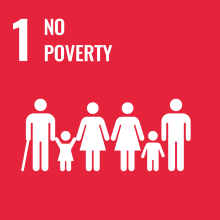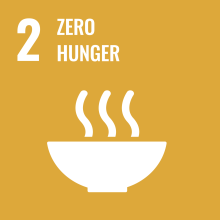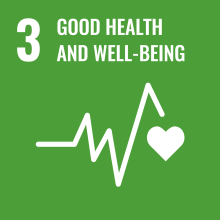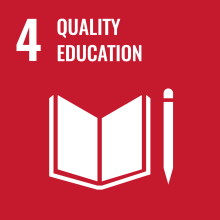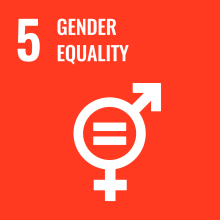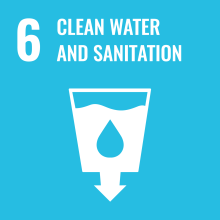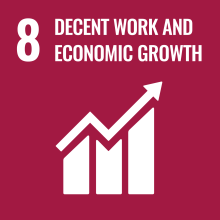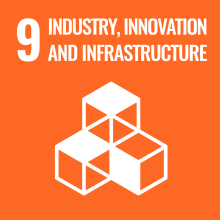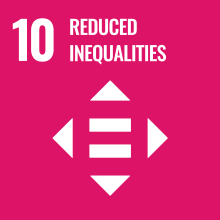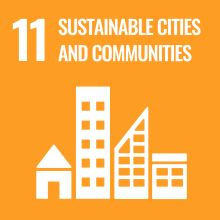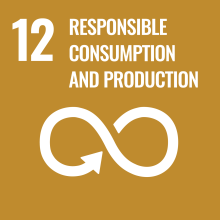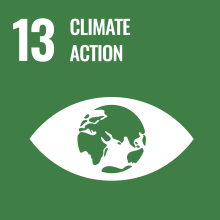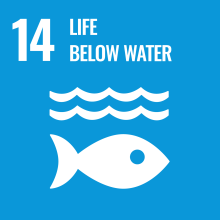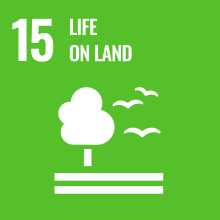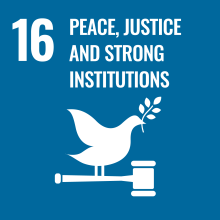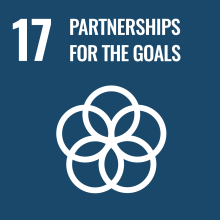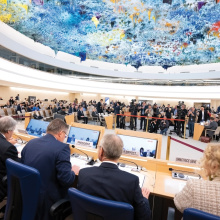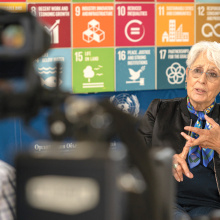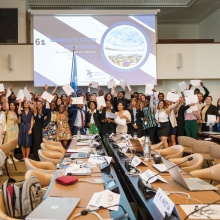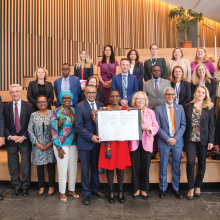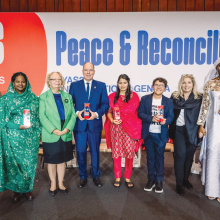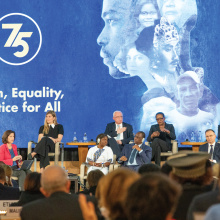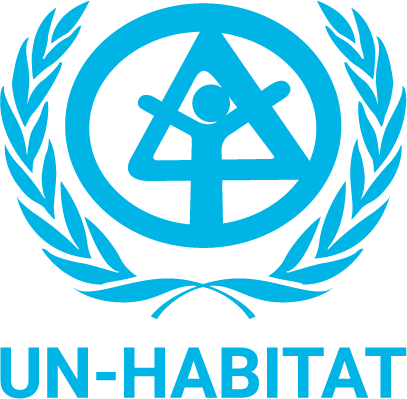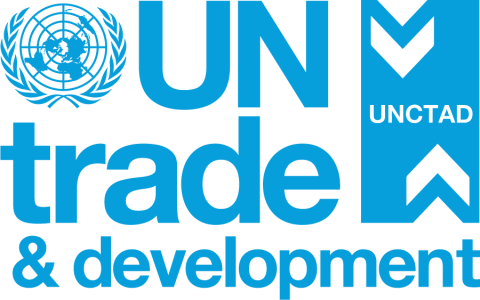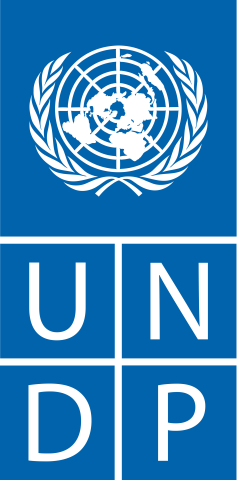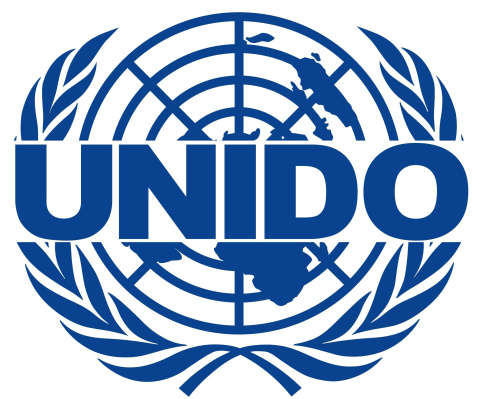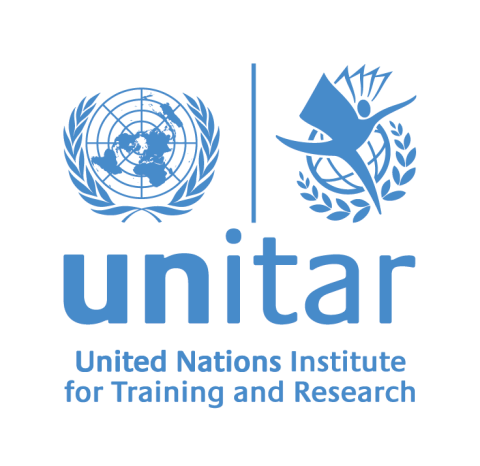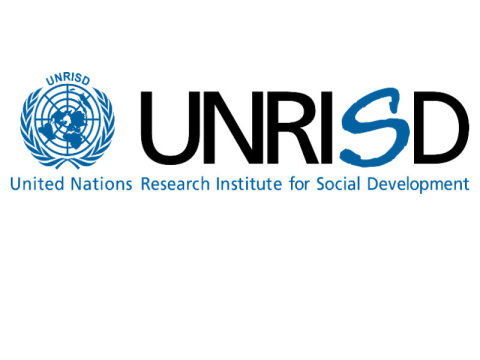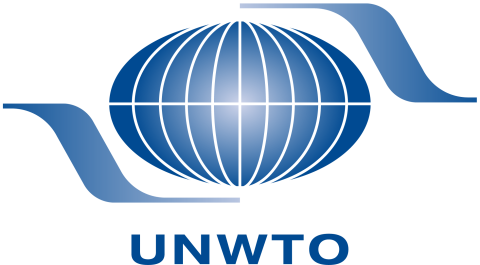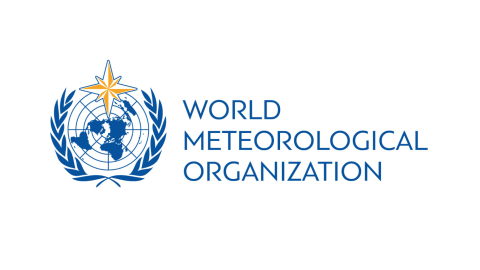
Fil d'Ariane
What are the SDGs?
Tracking progress
The goals are formulated as short, clear statements. But how to achieve “zero hunger”, “quality education” or “affordable and clean energy”? A set of targets for each goals sets the course, defining what exactly we want to achieve. These 169 targets are linked to a total of 248 indicators allowing us to measure the progress made for each goal.
The central body to review this progress is the High-Level Political Forum which convenes every year. States are encouraged to carry out national reviews of their performance in regular intervals, and the states under review share their experiences, successes, and mistakes made on their path towards the 2030 Agenda.
Also on an annual basis, the Secretary-General publishes an SDG report, prepared with input from the entire UN System, and other international and regional organizations, statisticians and experts from academia and civil society.
According to the 2024 report, current progress falls far short of what is required to meet the SDGs. Without "massive investment and scaled up action", we will not achieve our goals.
External assessment:
Third entities, such as universities and NGOs independently track the progress countries make towards the SDGs. The results are largely the same as the UN assessments: no country is on track to achieving the goals by 2030. The SDG Transformation Center gives a detailed overview on the progress countries make on each goal, and also, how they positively or negatively impact other states on their respective sustainability path.
Goal 5, “gender equality”, has nine targets, including:
Target 5.5
Ensure women’s full and effective participation and equal opportunities for leadership at all levels of decision-making in political, economic and public life
Indicators:
5.5.1 Proportion of seats held by women in (a) national parliaments and (b) local governments
5.5.2 Proportion of women in managerial positions
Mention in 2024 SDG report:
"Parity in women’s participation in public life remains elusive, and in management positions, at current rates, parity will require another 176 years. Women carry an unfair burden of unpaid domestic and care work, spending 2.5 times more hours a day on it than men. [...] Data from 120 countries show that from 2019 to 2023, 56 positive legal reforms focused on removing discriminatory laws and establishing legal frameworks to advance gender equality. Twenty-two reforms centred on equal rights to employment and economic benefits and 18 on stopping violence against women. The reforms included lifting restrictions on women working in specific sectors, guaranteeing equal remuneration for work of equal value".
More than half of the time has elapsed
Only 15 years were given to the world community to change their course of action from the core and to achieve the Global Goals. In 2023, we passed the halfway point. That year’s SDG report is a comprehensive midpoint review, pointing out the development gaps.
Reasons for the weak performance are, in addition to the COVID-19 pandemic, emerging wars and conflicts, and many member states’ actions falling short of their commitments, notably in the fields of climate finance and financial support for low- and middle-income countries.
"Unless we act now, the 2030 Agenda will become an epitaph for a world that might have been."
António Guterres, UN Secretary-General
Five areas for immediate action:
The 2023 midterm report raises five points which Member States should tackle urgently.
Heads of State and Government should recommit to seven years of accelerated, sustained and transformative action, both nationally and internationally, to deliver on the promise of the Sustainable Development Goals.
Governments should advance concrete, integrated and targeted policies and actions to eradicate poverty, reduce inequality and end the war on nature, with a focus on advancing the rights of women and girls and empowering the most vulnerable.
Governments should strengthen national and subnational capacity, accountability and public institutions to deliver accelerated progress towards achieving the Sustainable Development Goals.
The international community should recommit at the SDG Summit to deliver on the Addis Ababa Action Agenda and to mobilize the resources and investment needed for developing countries to achieve the Sustainable Development Goals, particularly those in special situations and experiencing acute vulnerability.
Member States should facilitate the continued strengthening of the United Nations development system and boost the capacity of the multilateral system to tackle emerging challenges and address Sustainable Development Goals-related gaps and weaknesses in the international architecture that have emerged since 2015.
UN Geneva has a role to play
The 2030 Agenda for Sustainable Development provides a blueprint for the work of the Secretariat and, therefore, for the UN in Geneva. The SDGs are embedded in everything UN Geneva does and sparked new partnerships and intensified collaboration across Geneva’s ecosystem, consisting of over 100 international organization, 180 Member State representations, some 400 NGOs, a dynamic private sector and prominent academic institutions. Geneva has therefore become an important hub for SDG implementation on a wide range of topics – from health, security and humanitarian affairs, to migration, digital policy and intellectual property.
The Perception Change Project (PCP), launched by the Director-General in 2014 and collaborating with over 100 partners, showcases the relevance and impact of the UN’s work on everybody’s life worldwide and encourages public engagement in implementing the 2030 Agenda. Examples of PCP’s work include the NotAWoman’sJob exhibition series; and a range of publications, notably action booklets and children’s books, to mention just a few of the examples of its output. One noteworthy PCP project has been the mapping of International Geneva with regards to their work towards attaining the SDGs.
The Beyond Lab in the Office of the UN Geneva Director-General is an innovation space, exploring ways to drive systems change for sustainability. The Beyond Lab looks, for example, at ways to measure development beyond a country’s GDP. The “Youth moving beyond GDP” initiative is part of an intergenerational dialogue series organized by the Beyond Lab. In its “Futures Balance” project, the Beyond Lab provides a tool for governments to identify sustainable investment areas – so that future generations will benefit from governments’ decisions made today.
UN Geneva supports the Common Agenda of the Secretary General, his vision for the future of global cooperation. The Common Agenda calls for inclusive, networked, and effective multilateralism to better respond and deliver for the people and planet and to get the world back on track by turbocharging action on the Sustainable Development Goals. The Summit of the Future, held in September 2024, was a major milestone on this path. Its main outcome document, the Pact for the Future, touches different areas, such as peace and security, sustainable development, digital cooperation, youth and future generations as well as human rights and gender. It stipulates some changes within the structure of the UN, including a Security Council reform, but its focus lies on addressing upcoming challenges, for example how to govern AI, and on considering the needs of future generations. In the area of sustainable development, a reform of the international financial sector was decided, improving services and support for developing countries. If applied as agreed, the Pact for the Future will turbocharge the implementation of the SGDs, and it can be a game changer towards a more sustainable world.
UN Geneva is being scrutinized as part of the UN's internal environmental sustainability initiative, Greening the Blue. In this context, UN Geneva is committed to reducing water, waste, and CO2 emissions.
See more initiatives from the International Geneva community to foster the SDGs
Organizations working on the SDGs
Le Mécanisme international, impartial et indépendant - Syrie (IIIM) a été créé en décembre 2016 par l'Assemblée générale pour aider à l'enquête et à la poursuite des personnes responsables des crimes les plus graves de droit international commis en République arabe syrienne depuis mars 2011.
L'IIIM [...]
L'Institution indépendante est une entité des Nations Unies créée par l'Assemblée générale le 29 juin 2023 en réponse aux appels urgents des familles des milliers de personnes disparues en Syrie pour déterminer leur sort et leur localisation. La résolution fondatrice de l'IIMP lui donne pour mandat [...]
Le Programme des Nations Unies pour les établissements humains, ONU-HABITAT, est l'agence des Nations Unies pour les établissements humains. Il est mandaté par l'Assemblée générale des Nations Unies pour promouvoir des villes et des villes socialement et écologiquement durables dans le but de [...]
ONU commerce et développement (CNUCED) est le principal organe des Nations Unies chargé du commerce et du développement. C'est une organisation intergouvernementale permanente créée par l'Assemblée générale des Nations Unies en 1964. La CNUCED aide les pays en développement à accéder plus [...]
Le PNUD est le principal organisme des Nations Unies qui lutte contre l'injustice de la pauvreté, les inégalités et le changement climatique. Travaillant avec un vaste réseau d'experts et de partenaires dans 170 pays, nous aidons les pays à développer des solutions intégrées et durables pour les [...]
En tant qu'organe du système des Nations Unies dédié à la formation, l'Institut des Nations Unies pour la formation et la recherche (UNITAR) fournit des solutions d'apprentissage innovantes aux individus, aux organisations et aux institutions afin d'améliorer la prise de décision au niveau mondial [...]
Le Service de Genève du Bureau des affaires de désarmement assiste les États Membres à soutenir leurs efforts de désarmement, de maîtrise des armements et de non-prolifération visant à atteindre l'objectif d'un désarmement général et complet sous un contrôle international strict et efficace.
Le [...]
Situé au Palais des Nations, l'Office des Nations Unies à Genève (ONUG) est le bureau de représentation du Secrétaire général à Genève. Point de convergence de la diplomatie multilatérale, l'ONUG a accueilli environ 8 000 réunions l'année dernière, ce qui en fait l'un des centres de conférence les [...]
L'UNOPS aide l'ONU et ses partenaires à fournir des solutions en matière de paix et de sécurité, d'aide humanitaire et de développement. Leur mission est d'aider les gens à bâtir une vie meilleure et les pays à parvenir à la paix et au développement durable.
Ils sont axés sur la mise en œuvre [...]
L’Institut de recherche des Nations Unies pour le développement social (UNRISD) est un institut autonome au sein du système des Nations Unies qui entreprend des recherches pluridisciplinaires sur les dimensions sociales des questions actuelles de développement, et qui analyse les politiques menées [...]
La présence de l'OMT à Genève a le potentiel d'accroître considérablement l'impact positif du tourisme en tant que moteur de développement. Dans le cadre des travaux du Bureau de liaison de l'OMT à Genève (GVLO) visant à représenter l'OMT auprès du système des Nations Unies et des missions [...]
L'Organisation météorologique mondiale (OMM) est une agence spécialisée des Nations Unies. C'est la voix autorisée du système des Nations Unies sur l'état et le comportement de l'atmosphère terrestre, son interaction avec les océans, le climat qu'elle produit et la répartition des ressources en eau [...]


